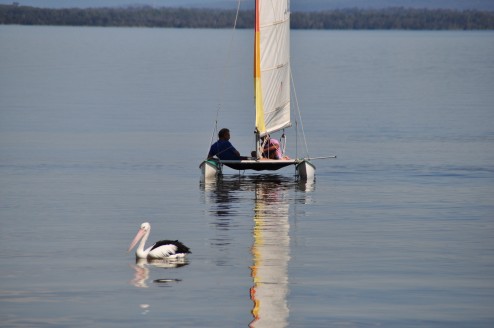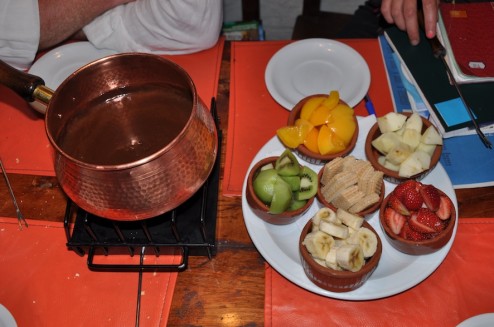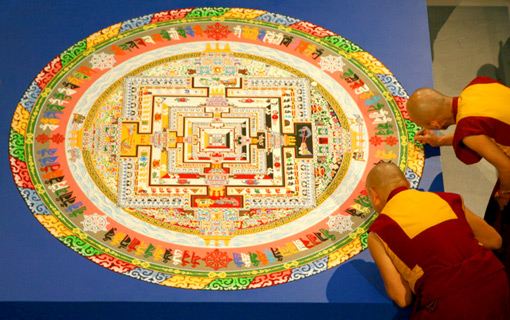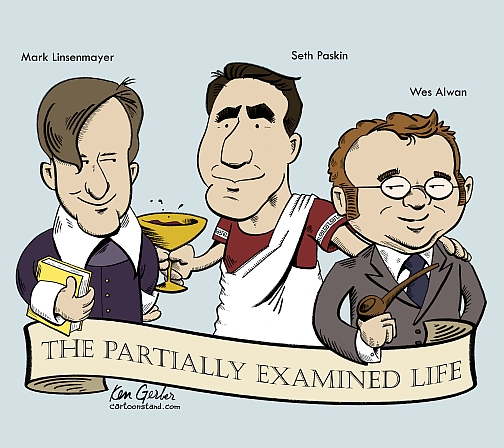“We must find ways to harmonize diversity with unity, the exercise of freedom with the common good, short-term objectives with long-term goals.” During my time in Costa Rica, I saw the construction of an institute dedicated to research and implementation of The Earth Charter, which is being built next to the University for Peace. The Earth Charter was developed over the last decade by an independent Earth Charter Commission, following the 1992 Earth Summit. The objective was “to produce a global consensus statement of values and principles for a sustainable future.” The document is the result of contributions from over five thousand people, and has been “formally endorsed by thousands of organizations, including UNESCO and the IUCN (World Conservation Union).”
The Earth Charter
Here it is, with blue being the parts I highlighted for my own reference as I consider them in relation to my own research. If you want to download the full version, in one of a great number of languages, click here.
PREAMBLE
“We stand at a critical moment in Earth’s history, a time when humanity must choose its future. As the world becomes increasingly interdependent and fragile, the future at once holds great peril and great promise. To move forward we must recognize that in the midst of a magnificent diversity of cultures and life forms we are one human family and one Earth community with a common destiny. We must join together to bring forth a sustainable global society founded on respect for nature, universal human rights, economic justice, and a culture of peace. Towards this end, it is imperative that we, the peoples of Earth, declare our responsibility to one another, to the greater community of life, and to future generations.
Earth, Our Home
Humanity is part of a vast evolving universe. Earth, our home, is alive with a unique community of life. The forces of nature make existence a demanding and uncertain adventure, but Earth has provided the conditions essential to life’s evolution. The resilience of the community of life and the well-being of humanity depend upon preserving a healthy biosphere with all its ecological systems, a rich variety of plants and animals, fertile soils, pure waters, and clean air. The global environment with its finite resources is a common concern of all peoples. The protection of Earth’s vitality, diversity, and beauty is a sacred trust.
The Global Situation
The dominant patterns of production and consumption are causing environmental devastation, the depletion of resources, and a massive extinction of species. Communities are being undermined. The benefits of development are not shared equitably and the gap between rich and poor is widening. Injustice, poverty, ignorance, and violent conflict are widespread and the cause of great suffering. An unprecedented rise in human population has overburdened ecological and social systems. The foundations of global security are threatened. These trends are perilous—but not inevitable.
The Challenges Ahead
The choice is ours: form a global partnership to care for Earth and one another or risk the destruction of ourselves and the diversity of life. Fundamental changes are needed in our values, institutions, and ways of living. We must realize that when basic needs have been met, human development is primarily about being more, not having more. We have the knowledge and technology to provide for all and to reduce our impacts on the environment. The emergence of a global civil society is creating new opportunities to build a democratic and humane world. Our environmental, economic, political, social, and spiritual challenges are interconnected, and together we can forge inclusive solutions.
Universal Responsibility
To realize these aspirations, we must decide to live with a sense of universal responsibility, identifying ourselves with the whole Earth community as well as our local communities. We are at once citizens of different nations and of one world in which the local and global are linked. Everyone shares responsibility for the present and future well-being of the human family and the larger living world. The spirit of human solidarity and kinship with all life is strengthened when we live with reverence for the mystery of being, gratitude for the gift of life, and humility regarding the human place in nature.
We urgently need a shared vision of basic values to provide an ethical foundation for the emerging world community. Therefore, together in hope we affirm the following interdependent principles for a sustainable way of life as a common standard by which the conduct of all individuals, organizations, businesses, governments, and transnational institutions is to be guided and assessed.
Principles
I. RESPECT AND CARE FOR THE COMMUNITY OF LIFE
1. Respect Earth and life in all its diversity.
a. Recognize that all beings are interdependent and every form of life has value regardless of its worth to human beings.
b. Affirm faith in the inherent dignity of all human beings and in the intellectual, artistic, ethical, and spiritual potential of humanity.
2. Care for the community of life with understanding, compassion, and love.
a. Accept that with the right to own, manage, and use natural resources comes the duty to prevent environmental harm and to protect the rights of people.
b. Affirm that with increased freedom, knowledge, and power comes increased responsibility to promote the common good.
3. Build democratic societies that are just, participatory, sustainable, and peaceful.
a. Ensure that communities at all levels guarantee human rights and fundamental freedoms and provide everyone an opportunity to realize his or her full potential.
b. Promote social and economic justice, enabling all to achieve a secure and meaningful livelihood that is ecologically responsible.
4. Secure Earth’s bounty and beauty for present and future generations.
a. Recognize that the freedom of action of each generation is qualified by the needs of future generations.
b. Transmit to future generations values, traditions, and institutions that support the long-term flourishing of Earth’s human and ecological communities.
In order to fulfill these four broad commitments, it is necessary to:
II. ECOLOGICAL INTEGRITY
5. Protect and restore the integrity of Earth’s ecological systems, with special concern for biological diversity and the natural processes that sustain life.
a. Adopt at all levels sustainable development plans and regulations that make environmental conservation and rehabilitation integral to all development initiatives.
b. Establish and safeguard viable nature and biosphere reserves, including wild lands and marine areas, to protect Earth’s life support systems, maintain biodiversity, and preserve our natural heritage.
c. Promote the recovery of endangered species and ecosystems.
d. Control and eradicate non-native or genetically modified organisms harmful to native species and the environment, and prevent introduction of such harmful organisms.
e. Manage the use of renewable resources such as water, soil, forest products, and marine life in ways that do not exceed rates of regeneration and that protect the health of ecosystems.
f. Manage the extraction and use of non-renewable resources such as minerals and fossil fuels in ways that minimize depletion and cause no serious environmental damage.
6. Prevent harm as the best method of environmental protection and, when knowledge is limited, apply a precautionary approach.
a. Take action to avoid the possibility of serious or irreversible environmental harm even when scientific knowledge is incomplete or inconclusive.
b. Place the burden of proof on those who argue that a proposed activity will not cause significant harm, and make the responsible parties liable for environmental harm.
c. Ensure that decision making addresses the cumulative, long-term, indirect, long distance, and global consequences of human activities.
d. Prevent pollution of any part of the environment and allow no build-up of radioactive, toxic, or other hazardous substances.
e. Avoid military activities damaging to the environment.
7. Adopt patterns of production, consumption, and reproduction that safeguard Earth’s regenerative capacities, human rights, and community well-being.
a. Reduce, reuse, and recycle the materials used in production and consumption systems, and ensure that residual waste can be assimilated by ecological systems.
b. Act with restraint and efficiency when using energy, and rely increasingly on renewable energy sources such as solar and wind.
c. Promote the development, adoption, and equitable transfer of environmentally sound technologies.
d. Internalize the full environmental and social costs of goods and services in the selling price, and enable consumers to identify products that meet the highest social and environmental standards.
e. Ensure universal access to health care that fosters reproductive health and responsible reproduction.
f. Adopt lifestyles that emphasize the quality of life and material sufficiency in a finite world.
8. Advance the study of ecological sustainability and promote the open exchange and wide application of the knowledge acquired.
a. Support international scientific and technical cooperation on sustainability, with special attention to the needs of developing nations.
b. Recognize and preserve the traditional knowledge and spiritual wisdom in all cultures that contribute to environmental protection and human well-being.
c. Ensure that information of vital importance to human health and environmental protection, including genetic information, remains available in the public domain.
III. SOCIAL AND ECONOMIC JUSTICE
9. Eradicate poverty as an ethical, social, and environmental imperative.
a. Guarantee the right to potable water, clean air, food security, uncontaminated soil, shelter, and safe sanitation, allocating the national and international resources required.
b. Empower every human being with the education and resources to secure a sustainable livelihood, and provide social security and safety nets for those who are unable to support themselves.
c. Recognize the ignored, protect the vulnerable, serve those who suffer, and enable them to develop their capacities and to pursue their aspirations.
10. Ensure that economic activities and institutions at all levels promote human development in an equitable and sustainable manner.
a. Promote the equitable distribution of wealth within nations and among nations.
b. Enhance the intellectual, financial, technical, and social resources of developing nations, and relieve them of onerous international debt.
c. Ensure that all trade supports sustainable resource use, environmental protection, and progressive labor standards.
d. Require multinational corporations and international financial organizations to act transparently in the public good, and hold them accountable for the consequences of their activities.
11. Affirm gender equality and equity as prerequisites to sustainable development and ensure universal access to education, health care, and economic opportunity.
a. Secure the human rights of women and girls and end all violence against them.
b. Promote the active participation of women in all aspects of economic, political, civil, social, and cultural life as full and equal partners, decision makers, leaders, and beneficiaries.
c. Strengthen families and ensure the safety and loving nurture of all family members.
12. Uphold the right of all, without discrimination, to a natural and social environment supportive of human dignity, bodily health, and spiritual well-being, with special attention to the rights of indigenous peoples and minorities.
a. Eliminate discrimination in all its forms, such as that based on race, color, sex, sexual orientation, religion, language, and national, ethnic or social origin.
b. Affirm the right of indigenous peoples to their spirituality, knowledge, lands and resources and to their related practice of sustainable livelihoods.
c. Honor and support the young people of our communities, enabling them to fulfill their essential role in creating sustainable societies.
d. Protect and restore outstanding places of cultural and spiritual significance.
IV. DEMOCRACY, NONVIOLENCE, AND PEACE
13. Strengthen democratic institutions at all levels, and provide transparency and accountability in governance, inclusive participation in decision making, and access to justice.
a. Uphold the right of everyone to receive clear and timely information on environmental matters and all development plans and activities which are likely to affect them or in which they have an interest.
b. Support local, regional and global civil society, and promote the meaningful participation of all interested individuals and organizations in decision making.
c. Protect the rights to freedom of opinion, expression, peaceful assembly, association, and dissent.
d. Institute effective and efficient access to administrative and independent judicial procedures, including remedies and redress for environmental harm and the threat of such harm.
e. Eliminate corruption in all public and private institutions.
f. Strengthen local communities, enabling them to care for their environments, and assign environmental responsibilities to the levels of government where they can be carried out most effectively.
14. Integrate into formal education and life-long learning the knowledge, values, and skills needed for a sustainable way of life.
a. Provide all, especially children and youth, with educational opportunities that empower them to contribute actively to sustainable development.
b. Promote the contribution of the arts and humanities as well as the sciences in sustainability education.
c. Enhance the role of the mass media in raising awareness of ecological and social challenges.
d. Recognize the importance of moral and spiritual education for sustainable living.
15. Treat all living beings with respect and consideration.
a. Prevent cruelty to animals kept in human societies and protect them from suffering.
b. Protect wild animals from methods of hunting, trapping, and fishing that cause extreme, prolonged, or avoidable suffering.
c. Avoid or eliminate to the full extent possible the taking or destruction of non-targeted species.
16. Promote a culture of tolerance, nonviolence, and peace.
a. Encourage and support mutual understanding, solidarity, and cooperation among all peoples and within and among nations.
b. Implement comprehensive strategies to prevent violent conflict and use collaborative problem solving to manage and resolve environmental conflicts and other disputes.
c. Demilitarize national security systems to the level of a non-provocative defense posture, and convert military resources to peaceful purposes, including ecological restoration.
d. Eliminate nuclear, biological, and toxic weapons and other weapons of mass destruction.
e. Ensure that the use of orbital and outer space supports environmental protection and peace.
f. Recognize that peace is the wholeness created by right relationships with oneself, other persons, other cultures, other life, Earth, and the larger whole of which all are a part.
The Way Forward
As never before in history, common destiny beckons us to seek a new beginning. Such renewal is the promise of these Earth Charter principles. To fulfill this promise, we must commit ourselves to adopt and promote the values and objectives of the Charter.
This requires a change of mind and heart. It requires a new sense of global interdependence and universal responsibility. We must imaginatively develop and apply the vision of a sustainable way of life locally, nationally, regionally, and globally. Our cultural diversity is a precious heritage and different cultures will find their own distinctive ways to realize the vision. We must deepen and expand the global dialogue that generated the Earth Charter, for we have much to learn from the ongoing collaborative search for truth and wisdom.
Life often involves tensions between important values. This can mean difficult choices. However, we must find ways to harmonize diversity with unity, the exercise of freedom with the common good, short-term objectives with long-term goals. Every individual, family, organization, and community has a vital role to play. The arts, sciences, religions, educational institutions, media, businesses, nongovernmental organizations, and governments are all called to offer creative leadership. The partnership of government, civil society, and business is essential for effective governance.
In order to build a sustainable global community, the nations of the world must renew their commitment to the United Nations, fulfill their obligations under existing international agreements, and support the implementation of Earth Charter principles with an international legally binding instrument on environment and development.
Let ours be a time remembered for the awakening of a new reverence for life, the firm resolve to achieve sustainability, the quickening of the struggle for justice and peace, and the joyful celebration of life.”

Searching for Unity in Diversity — at the University for Peace.













